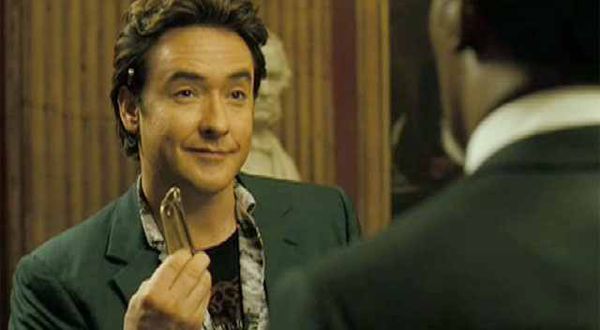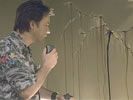Eye For Film >> Movies >> 1408 (2007) Film Review
1408
Reviewed by: Anton Bitel

"Hotels are a naturally creepy place, don't you think?", asks John Cusack's Mike Enslin in 1408.
As a limbo-like resting spot between one place and the next, the roadside inn has long been a staple of the classical ghost story, and its modern equivalent the hotel has proved just as accommodating to cinematic hauntings. Alain Resnais' modernist masterpiece Last Year In Marienbad (1961) unleashed the full potential of uncanniness from the grounds of a stately guesthouse, and his vision of symmetrical corridors and labyrinthine gardens would directly influence one of the greatest horror films of all time, Stanley Kubrick's similarly hotel-set The Shining (1980), adapted from a novel by Stephen King. And let's not forget, down a slightly different by-way, Alfred Hitchcock's Psycho (1968), which would spawn all manner of inferior motel slashers.

So Mikael Håfström's 1408 finds itself haunted by the anxiety of influence. Not only is it set in a possessed hotel, not only is it drawn once again from the writings of Stephen King, but it also features as its protagonist a blocked writer whose imagination begins to run riot from the moment he lays his bag on the bed – a figure already rather familiar from the Coen brothers' Barton Fink (1991), David Cronenberg's Naked Lunch (1991), or again Kubrick's The Shining. In short, this film checks into a generic space whose previous occupants have been amongst cinema's great and good – as well, one might add, as the not-so-good, like Disney's made-for-TV Tower Of Terror (1997), Tobe Hooper's retooled Toolbox Murders (2004), Gregory Dark's See No Evil (2006) and Nimród Antal's Vacancy (2007). Visiting the haunted hotel genre is as risky as booking into an actual hotel without a recommendation: there is an equal possibility that you may end up puttin' on the Ritz, or just staying in Motel Hell.
In fact, in terms of quality, 1408 is neither executive suite nor basement broom cupboard, but somewhere in between. If it is burdened with history, it readily acknowledges its debts, by casting Cusack, who has done this sort of thing before in James Mangold's Identity (2003), in the lead, by casting Tony Shalhoub (a veteran of Barton Fink) as Mike's publisher, and by emblazoning the wetsuit worn in one scene by Mike with the clear legend "psycho".
Problems, however, begin to set in when hotel manager Gerald Olin (Samuel L Jackson) is given a speech promising that his is a haunted hostelry like no other. It is a promise that, alas, will remain unfulfilled – at least for anyone familiar with the subgenre's established tropes. For while 1408 is full of all sorts of small-scale surprises (a clock-radio with a life of its own, a shifting room map, an unexpectedly capacious bar fridge), its overall plot unfolds as predictably as the ticking of a clock (even if it is a spookily recalibrated one).
Aspiring at one time to be a serious novelist, Mike Enslin has turned his back on his past and now is a hack writer, penning quickie 'ghost survival guides' for the mass market and concealing beneath his scepticism about the paranormal a more deep-seated sense of nihilism and despair. Warned in an anonymous postcard not to enter room 1408 at New York's Dolphin Hotel, he immediately sets about booking an overnight stay; and when the hotel manager takes him aside to reveal that 56 previous visitors have mysteriously died there and that the room is no longer available to the general public, Mike remains as unperturbed and insistent as ever. After all, as he says, "It's just a room."
A room, as it turns out, in which things go bump in the night, loudly and repeatedly. Mike will be put to the test by a veritable bombardment of both physical and psychological assaults that grow ever more personal, as time plays tricks, space reconfigures itself, pictures come to life, guests from the past return, and folk from much closer to home come a-visiting - until at last our hapless hero is forced to confront his own demons, and begins to consider checking out for good.
Despite its slick, often surreal direction, its engaging central performance, and its ever-shifting purchase on the reality that it constructs, 1408 will still leave you feeling relieved that you do not have to stay any longer than an hour and a half. For while the film plays a deft game with the viewer, leaving it unclear to the end (and perhaps beyond) whether Mike's experiences are a con trick, a sleeping nightmare, a drug-induced hallucination, a mental breakdown, a spiritual journey or a genuine ghostly haunting, there is something about its mawkish presentation of Mike's personal history that makes the prospect of revisiting the film's many twists and turns seem as repellent as it is necessary for a fuller understanding of the final scene.
The ghost story will always have in common with psychiatry a preoccupation with loss, grief and past trauma – but that does not mean that 1408 need feel quite so much like watching someone undergoing therapy.
Reviewed on: 07 Aug 2007


















